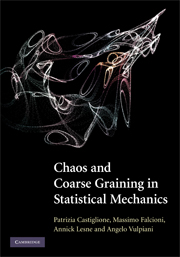Book contents
- Frontmatter
- Contents
- Preface
- 1 Basic concepts of dynamical systems theory
- 2 Dynamical indicators for chaotic systems: Lyapunov exponents, entropies and beyond
- 3 Coarse graining, entropies and Lyapunov exponents at work
- 4 Foundation of statistical mechanics and dynamical systems
- 5 On the origin of irreversibility
- 6 The role of chaos in non-equilibrium statistical mechanics
- 7 Coarse-graining equations in complex systems
- 8 Renormalization-group approaches
- Index
5 - On the origin of irreversibility
Published online by Cambridge University Press: 19 October 2009
- Frontmatter
- Contents
- Preface
- 1 Basic concepts of dynamical systems theory
- 2 Dynamical indicators for chaotic systems: Lyapunov exponents, entropies and beyond
- 3 Coarse graining, entropies and Lyapunov exponents at work
- 4 Foundation of statistical mechanics and dynamical systems
- 5 On the origin of irreversibility
- 6 The role of chaos in non-equilibrium statistical mechanics
- 7 Coarse-graining equations in complex systems
- 8 Renormalization-group approaches
- Index
Summary
Since in the differential equations of mechanics themselves there is absolutely nothing analogous to the Second Law of thermodynamics the latter can be mechanically represented only by means of assumptions regarding initial conditions.
Ludwig BoltzmannBy irreversibility here we mean a well evident fact which is part of the everyday experience of everybody: there are a lot of phenomena of which we do not see the reverse order evolution, and we do not expect to see it. For instance, if we put a hot coffee on the table then, after a while it gets colder, transferring some heat to the environment. However, if the coffee, at room temperature, has become too cold, and we want to warm it up, then we put it in the microwave oven. This is because we are pretty sure that the required heat will not come into the coffee from the surroundings, even if the reverse process has just taken place, as always. This certainty allows us to judge time ordering. Given the two states of the coffee on the table, hot and cold, we know that, without external intervention, the hot state cannot come after the cold state: it always comes before. As a consequence, once the cooling has occurred, we say that something (spontaneously) irreversible has happened. So, irreversibility is the asymmetric time evolution of certain macroscopic systems. The theoretical frame where this kind of irreversibility is accommodated is thermodynamics, where the Second Principle dictates the prohibitions.
The problem
As a fact within the coherent theoretical description of thermodynamics, irreversibility is not a problem.
- Type
- Chapter
- Information
- Chaos and Coarse Graining in Statistical Mechanics , pp. 120 - 149Publisher: Cambridge University PressPrint publication year: 2008



